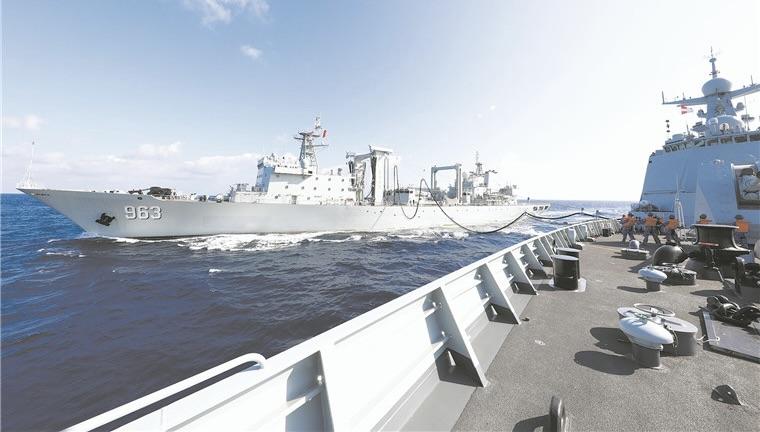Australia needs a plan for a Chinese navy presence in the Indian Ocean
Posted By Marcus Schultz on July 23, 2024 @ 09:00

Australia’s defence planners should carefully weigh the risks posed to its vital maritime trade connections by a persistent Chinese naval presence in the Indian Ocean. Some precautions must be taken now, as the need to deter harassment of Australia’s critical sea lines of communication (SLOCs) in the Indian Ocean isn’t very improbable or far off.
Leaving aside arguments for greater Australian capability to attack enemy ships and submarines, a higher allocation of defence resources to the region may be justified.
So far, China has had limited success [1] in acquiring shore-based replenishment capability to support its warships operating east of Somalia. But it could succeed suddenly by gaining access to key logistic bases and dual-use commercial ports in Africa, the Middle East, Southeast Asia and Indian Ocean island countries.
Meanwhile, upgrades to the Chinese naval fleet make it increasingly suited to distant operations. Larger, multirole combatants with advanced anti-ship, anti-air and anti-submarine weapons and sensors have replaced obsolescent, generally single-purpose ships. According to a 2020 China Maritime Studies Institute report [2], China has more than 100 warships and submarines that can operate in the Indian Ocean. This figure is likely to rise as the Chinese navy expands its surface combatant fleet to 435 ships by 2030. The US Navy plans to operate 290 warships [3] by the end of the decade.
If relations with the United States keep declining and if the US-Indian security relationship continues to improve, China will worry about its SLOCs. It could respond by deploying many ships to the Indian Ocean. The same deployment would threaten Australia’s SLOCs.
In an escalated low-level contingency, Australia would have to show its readiness to conduct strike and anti-submarine operations. It would need more reconnaissance of its northern and western approaches and more protection of offshore resources and port and naval infrastructure, including against covert mining. Failure to show resolve would cede the initiative to potential adversary forces and undermine deterrence.
Closer defence cooperation with selected Indian Ocean island countries could check Chinese efforts to gain access to overseas ports and logistic support. The government of Prime Minister Anthony Albanese has pledged [4] to increase Australian Defence Force deployments, training and exercises with the Maldives as well as Sri Lanka and Bangladesh. These are welcome developments upon which the Australian government and Department of Defence could easily build.
Some ways of strengthening Australia’s Indian Ocean defence cooperation can be inexpensive, as suggested by Asia-Pacific Development, Diplomacy and Defence Dialogue’s options paper [5] published in April. Opportunities include the placement of more defence attaches in missions in the region—including the Australian high commission in the Republic of Maldives—and establishing relationships between ADF Reserve units and small island states. The US State Partnership Program [6], which facilitates cooperation on civil-military affairs, could act as a model to inform the structure, shape and role of an Australian initiative.
Australian military leaders and defence planners should also look to improve proficiency in shipping protection and, if the work hasn’t been done already, develop a suite of maritime trade routing plans. They can look to successful strategies in Australian history, as discussed during the 2019 Goldrick Seminar [7] on Maritime Trade and its Implications for Australia’s Defence. One example given then was Australia’s experience instituting a convoying regimen during World War II to protect Australian merchant shipping against German surface, air and sub-surface (including mining) attack. Another was the comprehensive operational analysis capability of the performance of the Royal Australian Navy exercise system developed by the RAN Research Laboratory (later incorporated into what is now the Defence Science and Technology Group). In the absence of an overarching maritime security strategy [8], further work along these lines would help reinforce and make credible Australia’s deterrence by denial strategy.
Australia won’t have to meet potential mid-Indian Ocean security concerns alone, thanks to increasing security cooperation with India and Britain and the alliance with the United States. Moreover, the current plan [9] to expand the surface combatant fleet to 26 major warships from 11 (at the time of the February announcement) will see Australia operate its largest navy since World War II. Australian maritime doctrine [10] and tactics will need updating accordingly. This will be essential to ensure our sailors can deter meaningful threats to merchant shipping and maritime trade if needed.
These measures should form part of a whole-of-nation approach to Australia’s evolving defence policy and planning in the Indian Ocean region. The Chinese navy will no doubt continue to expand its presence and reach in this important geopolitical arena. Australia is taking important first steps to achieving an effective deterrence strategy, but more is needed.
Article printed from The Strategist: https://aspistrategist.ru
URL to article: /australia-needs-a-plan-for-a-chinese-navy-presence-in-the-indian-ocean/
URLs in this post:
[1] limited success: https://www.fpri.org/article/2023/05/sustaining-the-chinese-navys-operations-at-sea-bigger-fists-growing-legs/
[2] report: https://digital-commons.usnwc.edu/cmsi-maritime-reports/11/
[3] 290 warships: https://sgp.fas.org/crs/row/RL33153.pdf
[4] pledged: https://www.minister.defence.gov.au/media-releases/2024-04-17/2024-national-defence-strategy
[5] options paper: https://asiapacific4d.com/idea/indian-ocean-engagement/
[6] US State Partnership Program: https://www.nationalguard.mil/leadership/joint-staff/j-5/international-affairs-division/state-partnership-program/
[7] 2019 Goldrick Seminar: https://navalinstitute.com.au/wp-content/uploads/Protecting-Australian-Maritime-Trade-Report-2022-Final-version.pdf
[8] overarching maritime security strategy: /australia-needs-an-overarching-maritime-security-strategy/
[9] current plan: https://www.aspistrategist.ru/report/cost-defence-aspi-defence-budget-brief-2024-2025
[10] maritime doctrine: https://seapower.navy.gov.au/sites/default/files/documents/Amd2010.pdf
Click here to print.